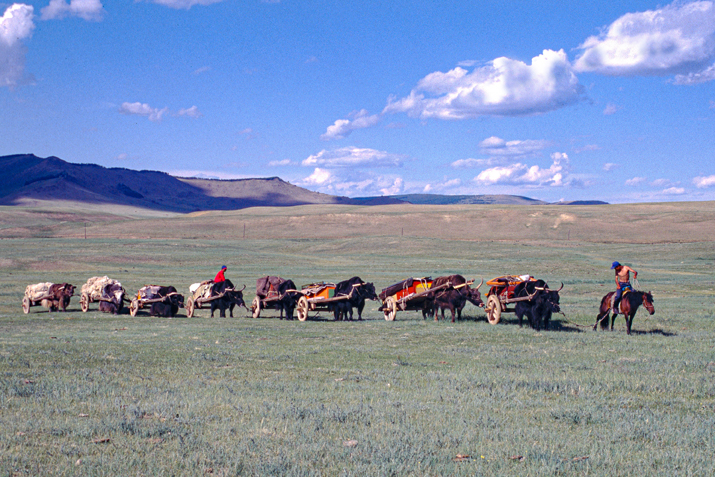
Visit to the Tuwa
N 51°21'785'' E 099°21'046''
Day: 124
Sunrise:
08:55
Sunset:
17:23
As the crow flies:
50
Daily kilometers:
70
Total kilometers:
1211
Soil condition:
Ice, snow
Temperature – Day (maximum):
minus 13°C
Temperature – day (minimum):
minus 18°C
Temperature – Night:
minus 30°C
Latitude:
51°21’785”
Longitude:
099°21’046”
Maximum height:
1475 m above sea level

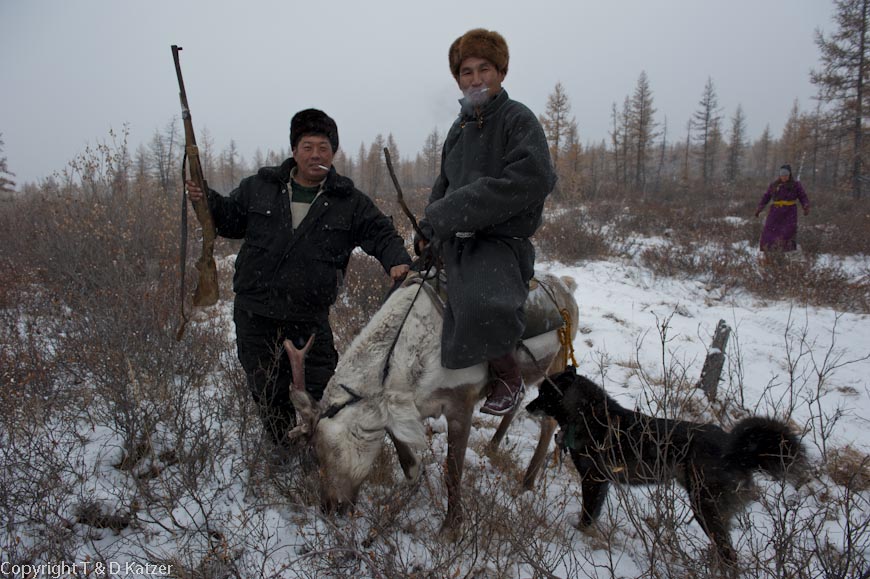

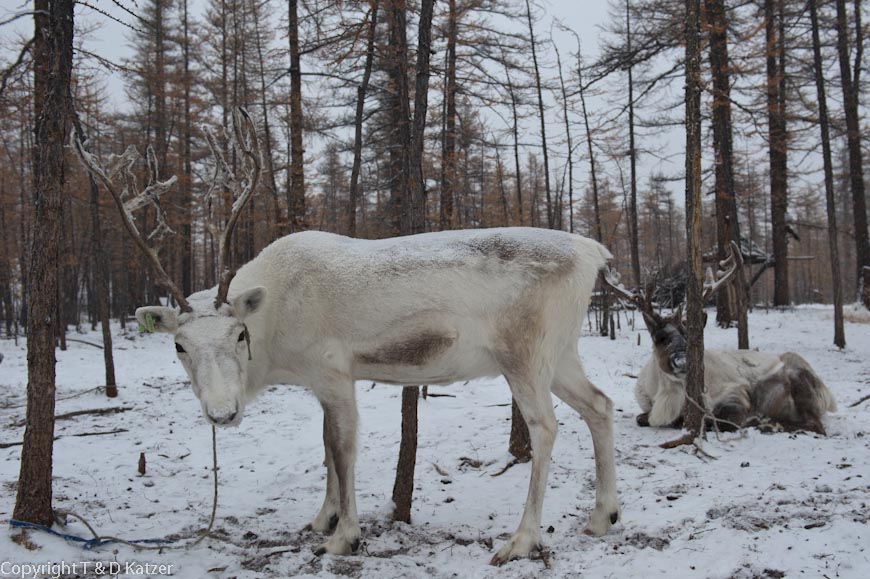
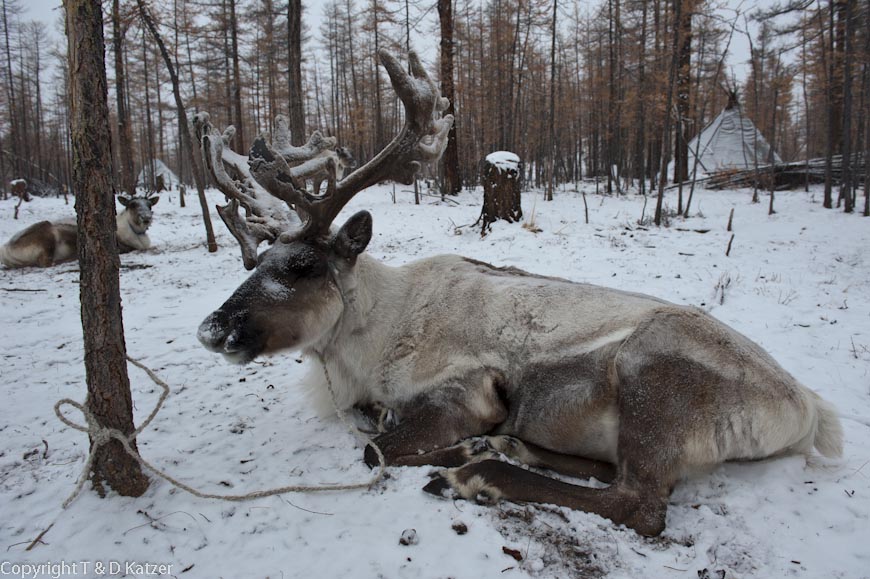

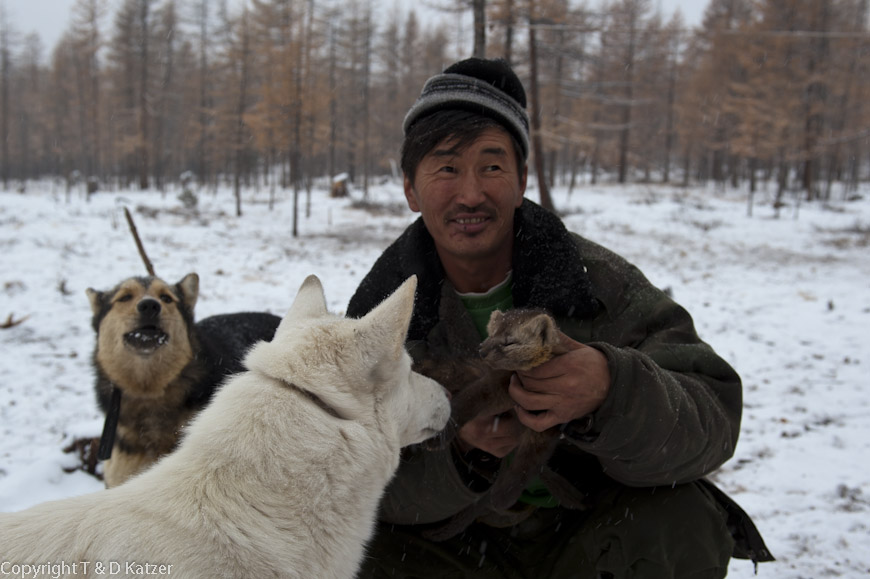
Nine days after the conversation with Tsaya, the time has come. We organized a Russian four-wheel drive bus, of course not without negotiating the inflated fare properly. Tsendmaa, who has made friends with Tanja in the meantime, doesn’t miss the opportunity to accompany us. For them, this trip is a welcome change from the monotonous everyday life with their old stepparents. We get into the car with our gifts and Mogi and, as we have rented the car for ourselves, are surprised at the four passengers present. It turns out that the men are friends of the driver, who are apparently also happy about the change to pay the Tuwa a visit. They welcome us with laughter and exuberance. They immediately offer us a mug of vodka, which we repeatedly drink during the journey.
We leave Tsagaan Nuur in a light snowstorm. As soon as the village is behind us, there is no longer a recognizable road. The driver steers his vehicle onto the ice of the White Lake to cross it. Then we follow a thin track that winds steadily and gently upwards. “There’s a fox!” I shout. Everyone immediately looks out of the windows, following the fleeing animal with their eyes. The driver immediately leaves the narrow path and drives after the fox. However, we lose his scent after just a few hundred meters. Then the man turns his rattling tin bump on wheels and we follow the narrow strip in front of us again. It doesn’t take long and the weather gets noticeably worse. Snowflakes clog the windshield. The driver pulls a lever and two wiper blades are set in motion, smearing the windshield. The increasingly poor surface forces the four-wheel drive bus to drive at walking pace. The coarse wheels work their way through deep holes, trenches and cracks. It goes over roots and tufts of frozen grass. We are thrown back and forth on our seats like fallen fruit. We pull our heads in like turtles to avoid hitting the ceiling. The mountains around us are hidden behind gray snow clouds. The first trees of the taiga first appear sporadically and then more and more frequently. After a good hour, we take a short break. Because there is no longer any danger of spilling the vodka, the bottle immediately circles again. The men become more and more exuberant.
I stretch my feet and walk around a bit. My eyes follow the path when I suddenly spot a movement in the forest. At first I can’t believe my eyes, but on closer inspection I discover a lanky, relatively small animal sitting on top of me. “There’s a Tuwa there,” I say to Tanja in surprise. Just seconds later, our drunken companions spot him too. They shout loudly and wave the strange man towards us. Slowly he rides up. A dog runs alongside the reindeer that he rides like my horse. The man looks like an apparition from another world. He has a rifle on his shoulder and is obviously on the hunt. As soon as he reaches our four-wheeler, he gets off his unconventional mount and is pushed into the bus. Only moments pass and our Mongolian companions hand the hunter a cup of vodka. Another one swings onto the reindeer and poses with his friend in front of my camera. Then they take the Tuwa’s old rifle and shoot at something sitting in a tree. When the shooter pulls the trigger, there is only a “click”. After the third jam there is a bang and the small caliber leaves the barrel to disappear somewhere in the treetops. “Ha, ha, ha,” the men laugh. While the shooter now sits down in the minibus to continue drinking, the other one rides off in a reindeer trot. The Tuwa is still sitting in our bus and drinking. Then the fun ride continues. We now follow the reindeer tracks that leave clear and distinct imprints in the thin snow cover.
Suddenly, a clearing opens up in the middle of the dense forest. Downed trees bear witness to human presence. “There they are,” I say, pointing to a few tepees and log cabins. The driver stops his four-wheel drive bus next to one of the two log cabins. We get out and are immediately greeted by Tsaya. “Come in, she invites us into her log cabin. We bend down through the low wooden door and step over the threshold into a relatively dark room. Pale light filters into the room through two small windows covered with thin, transparent plastic sheets. “Have a seat,” Tsaya says, pointing to a low bed with only a thin mattress on top of the wooden boards. In the middle of the room, a subdued fire burns in the same stove that can be seen everywhere in the yurt. I let my gaze glide through the hut. There is not much to see. The furnishings are very spartan. Sawed-off wooden stumps serve as stools. The kitchen is a frame nailed together with simple boards and logs. Tsaya keeps flour, salt, dishes and cups there. On the opposite side of the entrance hangs the obligatory tapestry that many Mongolians also have in their yurts or homes. It usually shows Genghis Khan’s portrait, a wolf or a bear.
Tsaya offers tea and home-baked bread to all the men. Each of them reaches out confidently. Tanja and I look at each other. We realize that absolutely everything that people consume has to be transported here by difficult and expensive means. Nevertheless, Mongolian hospitality requires that tea and bread or pastries be offered to every guest. The men talk animatedly and act as if they were at home here. Since they came with us, we are a little embarrassed by their appearance.
“Where are your reindeer?” asks Tanja, because we haven’t seen any apart from the hunter’s one saddled mount. They are grazing in the woods. But the men bring them to our camp every evening,” she explains. “Why are you bringing them to camp? It’s a lot of work,” I ask. “Because otherwise they will be attacked and eaten by wolves. Wolves are a real problem for us. We lose a number of animals every year. A few have already been killed this year too. Here at the camp we have a better overview. The dogs also attack when wolves come into the camp,” she explains. “Do the reindeer stay in the camp? Surely they’ll run away again if you don’t tie them up?” I ask. “That’s right, we tie them up.” “You tie every single reindeer?” “Yes, they are tied to trees in groups. That way they can’t run away. We drive them into our clearing in the evening and lure them with salt.” “How do you lure them with salt?” “Reindeer love salt. We rustle the bags containing the salt and let them lick it. That way we have control over our animals. As we’ve been with them since birth, each of them is quite tame,” explains Tsaya. “Let’s go outside. They’ll be here any minute,” she urges us to leave her hut.
We wait a little excitedly in the clearing as the first animals trundle through the woods. It is an interesting and at the same time unusual sight as the white animals run through the needleless larch forest directly into the clearing. “Is there anything we can do?” I ask. “Yes, help the woman there catch her animals,” says Tsaya. “Okay,” I reply, not knowing how to do this. I watch the Tuwa woman as she grabs each individual animal by a rope tied around its neck and knots it to a tree. “Good, I can do that too,” I think and try to catch my first reindeer. Of course it runs away excitedly. I’m a bit smarter on the second attempt. I approach the buck as if I would never think of trying to catch it. As he lowers his antlers to eat a few lichens, I reach for the rope. And lo and behold, I have now caught my first reindeer. I proudly bring it to the woman who thanks me with a laugh. Tanja, meanwhile, is busy with the same task and is also successful. I can see from her smile how much she enjoys it.
When all the reindeer have been tied to their places, everyone goes to the second log cabin. A few women and Tuvan men fill the room. Our drunken Mongolians are also added to the mix. People talk and vodka is served. “When should we talk about our request?” I ask Tsaya. “Now is a good time,” she replies. However, I don’t have the slightest chance of being heard. One of the guests we brought with us is so drunk by now that he gets up and makes a never-ending speech, roaring and bawling. “He’s a shaman,” says Tsaya. “Obviously an extremely drunk one at that,” I reply with a grin. “What do you think? When do you want me to speak to your people?” “Now. Otherwise you can wait until tomorrow morning. He won’t stop talking,” says Tsaya. I cautiously begin to say something, whereupon three of the women present turn to me and actually listen. Apparently they often have drunken shamans here who give slurred lectures.
“We were in your beautiful Mongolia back in 1996. Back then we heard about you and since then we have cherished a dream of spending a winter with you. It took us 15 years to make this dream come true. Now, after 15 years, we have come to you to ask if we can share our lives with you for a while? We are not a burden because we will bring everything you need. We don’t want to disturb you, we just want to be here. Should you not be happy with our presence after a while, we will of course leave again. We don’t want to impose our presence on you,’ I say, interrupted by the loud shaman who thunders his speech even louder into the room, which is why any other noise is silenced.
The women nod in a friendly manner and it doesn’t take long for everyone present to agree to our imminent visit. “You’ve definitely got something good with me. Someone as good as you at catching reindeer and helping to tie them up is always welcome here,” she says, to which everyone laughs heartily. As agreed, we leave Tsaya three bottles of vodka, tobacco, tea and cookies to distribute our gifts among the Tuwa. “Because our men have already had quite a bit of vodka, I won’t give them your presents until you’ve left. That’s better, otherwise they’ll get too drunk,” she says.
It is already dark when we say goodbye to the Tuwa and Tsaya. The headlights of the four-wheel drive bus eat their way through the darkness and come across the tracks of wolves. A Tuwa woman and her husband take the opportunity to travel with us to Tsagaan Nuur. The vodka continues to circulate and Mongolian singing can be heard. The 75-year-old Tuwa woman drinks and sings along vigorously. She laughs exuberantly and, despite her age, she doesn’t seem to be inferior to the men when it comes to drinking.
We look forward to your comments!

